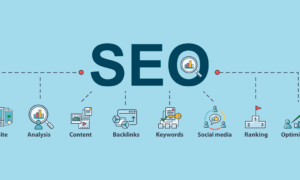Search Engine Optimization, commonly known as SEO, is a fundamental aspect of digital marketing that aims to increase website visibility and organic traffic from search engine results pages (SERPs). In this article, we will delve into the world of SEO, exploring its importance, how search engines work, key on-page and off-page factors, technical considerations, best practices, and more.
Introduction to SEO
In the vast digital landscape, SEO acts as a compass for businesses and individuals seeking to improve their online presence. It encompasses a range of strategies and techniques aimed at optimizing websites for search engines, with the ultimate goal of ranking higher in organic search results.
Understanding Search Engines
To grasp the significance of SEO, it is crucial to understand how search engines operate. Search engines, such as Google, Bing, and Yahoo, employ complex algorithms to crawl and index web pages. These algorithms consider various factors when determining the relevance and ranking of websites.
Importance of SEO
SEO plays a pivotal role in driving organic traffic, increasing brand visibility, and ultimately improving conversion rates. By optimizing your website according to SEO best practices, you enhance its chances of appearing in front of users actively searching for products, services, or information related to your industry.
How Search Engines Work
Search engines employ sophisticated crawlers to explore the vast internet, collecting data about web pages and indexing them based on specific criteria. Understanding the basics of crawling, indexing, and ranking algorithms helps you tailor your SEO efforts accordingly.
On-Page SEO Factors
Keyword Research: A vital starting point for any successful SEO campaign is comprehensive keyword research. By identifying relevant keywords and phrases that align with your content and target audience’s search intent, you can optimize your website accordingly.
Content Optimization: Crafting high-quality, informative, and engaging content is pivotal to on-page SEO. Optimizing your web pages with relevant keywords, headings, meta descriptions, and internal linking improves their visibility and user experience.
Meta Tags: Meta tags provide search engines with information about your web pages. Optimizing meta title tags, meta descriptions, and other meta attributes helps improve click-through rates from search results.
Off-Page SEO Factors
Link Building: Building a robust network of high-quality backlinks is a crucial off-page SEO factor. These backlinks act as votes of confidence for search engines, indicating the credibility and authority of your website.
Social Media Engagement: Active participation in social media platforms fosters brand awareness, amplifies content reach, and drives traffic to your website.
Online Directories: Listing your business in relevant online directories enhances your online visibility and improves local SEO efforts.
Technical SEO
Website Speed and Performance: Optimizing website speed and performance improves user experience and search engine rankings. Techniques like caching, image optimization, and reducing server response time contribute to better website performance.
Mobile Optimization: With the growing prevalence of mobile devices, ensuring your website is mobile-friendly is essential. Responsive design, fast-loading mobile pages, and intuitive user experiences are crucial for SEO success.
SEO Best Practices
Creating Quality Content: Developing valuable, unique, and shareable content is paramount for SEO success. By focusing on providing value to your audience, you can increase engagement and attract organic backlinks.
Building Backlinks: Earning high-quality backlinks from authoritative websites improves your website’s credibility and boosts its visibility in search results.
SEO Tools and Analytics
Utilizing SEO tools and analytics platforms provides valuable insights into your website’s performance. Tools like Google Analytics, Google Search Console, and third-party software assist in monitoring and optimizing your SEO efforts.
Keeping Up with SEO Trends
SEO is a dynamic field, continuously evolving to adapt to search engine algorithm updates and changing user behavior. Staying informed about the latest SEO trends, industry news, and algorithmic changes help you maintain a competitive edge.In conclusion, SEO is an integral part of digital marketing that helps businesses and individuals optimize their websites for search engines. By understanding the fundamentals of SEO, including on-page and off-page factors, technical considerations, and best practices, you can enhance your website’s visibility, attract organic traffic, and achieve your online goals. To simplify the SEO process and streamline your optimization efforts, you can also leverage innovative tools and platforms like EasySEO.ai. With easyseo.ai, you can gain valuable insights, automate tasks, and stay ahead of the competition in the ever-evolving world of search engine optimization.



































